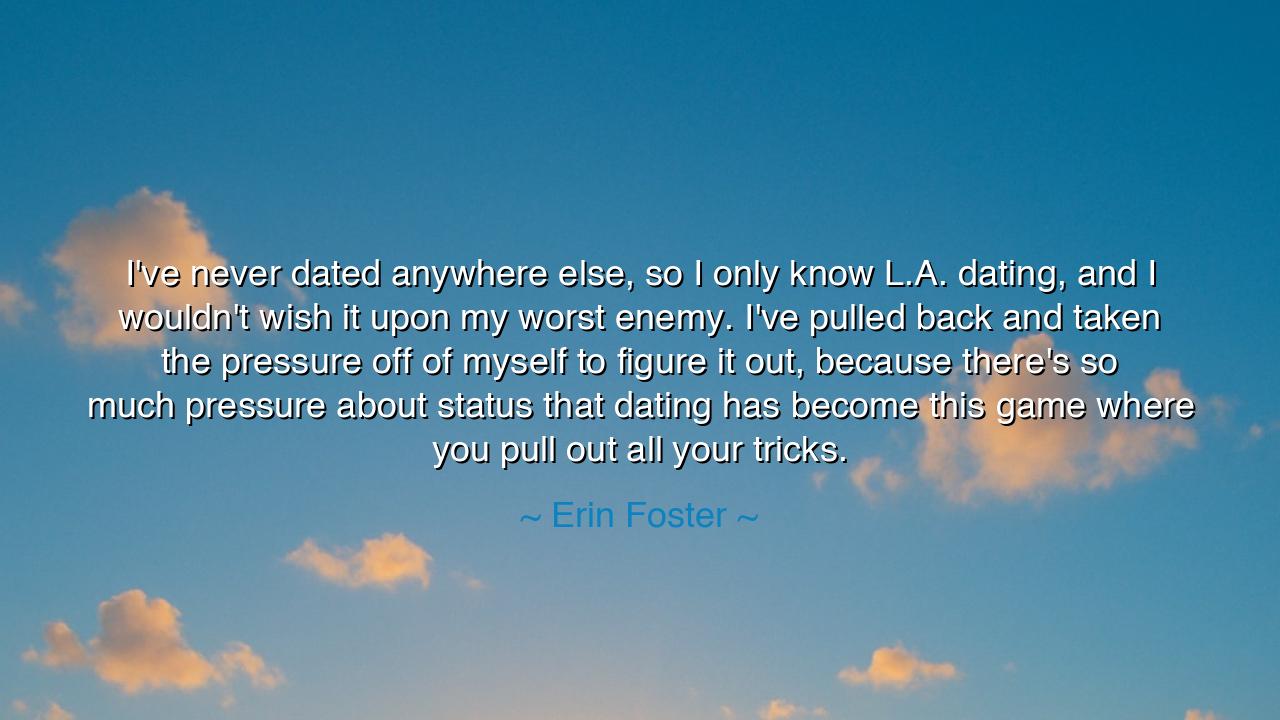
I've never dated anywhere else, so I only know L.A. dating, and I
I've never dated anywhere else, so I only know L.A. dating, and I wouldn't wish it upon my worst enemy. I've pulled back and taken the pressure off of myself to figure it out, because there's so much pressure about status that dating has become this game where you pull out all your tricks.






In the words of Erin Foster, we hear a lament that speaks not merely of love, but of the world that has forgotten how to love: “I've never dated anywhere else, so I only know L.A. dating, and I wouldn't wish it upon my worst enemy. I've pulled back and taken the pressure off of myself to figure it out, because there's so much pressure about status that dating has become this game where you pull out all your tricks.” Her confession, though born of the modern age, carries the timeless weariness of a soul disenchanted by the illusions of vanity. Beneath the glimmer of her words lies a truth the ancients knew well — that when love becomes a performance, it ceases to be love at all.
In Foster’s reflection, the city of Los Angeles is not just a place; it is a symbol — a temple of masks, where hearts are veiled beneath ambition and affection is measured not in sincerity, but in status. To “pull out all your tricks,” as she says, is to turn the sacred ritual of connection into a contest of appearances. The ancients would have recognized this sickness of the spirit. The philosopher Socrates, walking through the marketplace of Athens, once observed that men filled their lives with possessions and titles, yet starved in the soul. He warned that the pursuit of status is a shadow chase — it leaves one rich in image, but poor in truth. Foster’s words echo that warning, centuries later: that in the game of pretense, even victory feels hollow.
She speaks, too, of pressure — that invisible weight the world places upon those who seek to love in a time of competition. The ancients called such pressure hubris, the pride of those who place appearance above essence. When love becomes a ladder for validation, it collapses under its own falseness. Foster’s decision to “pull back,” to remove herself from the game, is an act of quiet rebellion, a refusal to sacrifice her peace upon the altar of pretense. In that moment, she joins a long lineage of souls — prophets, poets, and thinkers — who chose truth over spectacle. For sometimes, withdrawal is not surrender, but wisdom.
Consider the story of Diogenes of Sinope, the philosopher who lived in a barrel and mocked the vanity of men. When Alexander the Great, ruler of the world, stood before him and asked, “What can I do for you?” Diogenes simply replied, “Stand out of my sunlight.” In that defiance, he revealed the heart of authenticity — that true power lies not in possessions or status, but in freedom from their control. So too does Foster’s voice carry that same defiance, softened by experience. She rejects the world’s applause, choosing instead the quiet dignity of self-understanding. To “take the pressure off” is to stand again in one’s own light.
Her words also reveal the loneliness of modern love, where every connection is filtered through the lens of competition. When one must perform to be chosen, the self becomes fragmented — a collection of “tricks” rather than truths. Yet, love, in its purest form, has no tricks. It is not strategy, but surrender; not status, but stillness. The ancients spoke of agape — the love that expects nothing, that gives because it overflows. In this light, Foster’s frustration is not cynicism, but longing — a yearning to return to love’s original simplicity, where hearts meet without pretense.
From her words, a lesson emerges for those who walk in the modern world of images. Withdraw from the games that diminish you. Seek connection not in performance, but in presence. When the world demands you dazzle, dare to be still. When it asks for your tricks, offer instead your truth. Let the pressure of status dissolve like mist before the morning sun, for no heart was ever moved by wealth, beauty, or cleverness — only by authenticity. To love truly is to be seen, not showcased.
And so, let Foster’s words stand as both warning and wisdom. The world may tempt you to play the game — to wear the mask, to chase the applause — but remember that real love flourishes only where pretense dies. Strip away the performance. Be raw, be flawed, be real. For the ancients knew, and the wise still know: the soul that seeks love in truth will find it, though the whole world pretend otherwise. And when you stand alone, free of the game, you will discover that the heart — unburdened by illusion — is already enough.






AAdministratorAdministrator
Welcome, honored guests. Please leave a comment, we will respond soon